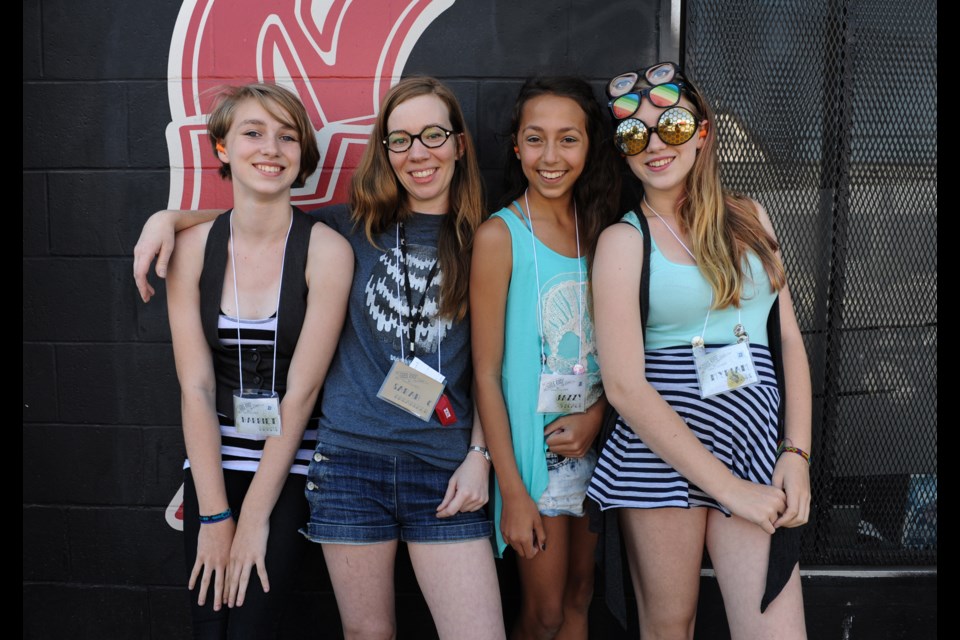Woodland Park was full of girls late Thursday morning. Some sat cross-legged around their drums, intently watching Joy Mullen — better known in the local music scene as “Joy on Drums” — hit her snare. Over by the shade of the trees, another group pumped the air with their fists, mic in opposite hand, and mouthed words to faint music coming from their instructor’s smartphone as they learned about stage presence.
As Sarah Cordingley, one of the organizers of Girls Rock Camp Vancouver, watched, she remembered her first experience with an all-girl musical group when she joined the Vernon Girls Trumpet Band at age 11.
“It was a really, really positive thing for me,” she said. “It didn’t have any politics behind it, it was a very old-fashioned, military drumming band but it was just so fun to play with other girls.”
Even still, it never occurred to Cordingley a few years later that she, a music lover, could actually be in a rock band herself, instead resorting to playing supporting roles such as photographer/girlfriend. “I felt really on the outside,” she remembered.
Evidently it wasn’t just Cordingley who felt there was a wall to climb as a woman wanting to play rock ’n’ roll. The first Girls Rock Camp started in Portland, Ore. in 2001, a city where embers of the Pacific Northwest feminist punk rock movement of the 1990s still glowed. Other cities across the U.S. soon followed suit and, in 2007, the Girls Rock Camp Alliance network became official at a Portland-based conference that included representatives from five American camps along with two European ones. The focus of the camps, now also held in Iceland and South America, is to help girls build self-esteem through musical creation.
It’s the sixth year for the Vancouver version and while it may seem North American society has flung doors open to women in the music industry, Cordingley says there’s still much work to do.
“There are so many more women musicians now than there was five or 10 years ago, but there’s still not a lot of female audio engineers or female sound techs,” she said, adding that finding a woman to work the board at the camp’s wrap-up showcase every year at the Rio Theatre is a challenge. “We want to open up these avenues for girls and stop this kind of nonsense that stops them from doing it. When I walk down the street with a couple of snare drums that I’m going to fix, some people look at me like it’s a novelty — ‘Oh, there’s a girl with drums, isn’t that something.’ I don’t understand why, or what the difference is between a woman carrying drums or a man. I don’t want to be a novelty, I just want to play the drums.”
Cordingley, who is also the music director at University of B.C. radio station CiTR, said she finds it frustrating to continually witness the over-sexualization of female musicians.
“Why does it have to be a ‘hot chick drummer’ rather than ‘oh, that person is a good drummer’? If you’re a woman who’s playing an instrument, are you going to be judged differently than a man? I think so,” Cordingley said. “It’s really a big thing because Rock Camp is not about proving anything. It’s about expressing yourself and the whole idea here is not to create little virtuosic solo machines, it’s more about taking up space, being loud, feeling confident.”
Thirty-two girls between the ages of eight and 17 attend Rock Camp every year in the space donated by the Urban Native Youth Association (in return, camp organizers reserve 10 spots for First Nations girls) and the instruments are either brought from home by the campers, provided by the camp organizers and their friends, or donated by organizations such as Music B.C.
Between learning an instrument to perform at the wrap showcase concert at the Rio Theatre Saturday night, the week-long camp is jammed with workshops that range from songwriting to self-defense.
Cordingley doesn’t see Girls Rock Camp going away any time soon.
“Maybe one day there won’t be the need to have a rock camp, when women and minorities and people of colour and people of different sexual or gender identities are not excluded from rock music in such a complete way in the big mainstream picture,” she said. “We don’t want to box people into stereotypical roles where you need to look a certain way. It’s unattainable and ridiculous and boring.”



